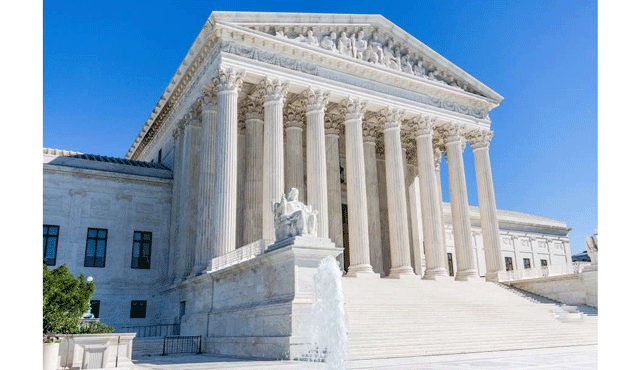CNA Staff, Jul 8, 2020 / 08:55 am (CNA) – The Supreme Court on Wednesday delivered a long-awaited religious liberty decision on the right of religious schools to hire and fire teachers. The court found in favor of two Catholic schools in California, ruling that a “ministerial exception” to government interference applies to teachers in religious schools.
The ruling came in the consolidated cases of Our Lady of Guadalupe School v. Morrissey-Berru and St. James Catholic School v. Biel. The justices ruled in a 7-2 decision that teachers at Catholic grade schools qualified for the “ministers exception” established by the court in the 2012 Hosana Tabor case.
“The religious education and formation of students is the very reason for the existence of most private religious schools, and therefore the selection and supervision of the teachers upon whom the schools rely to do this work lie at the core of their mission,” wrote Justice Samuel Alito for the majority.
“Judicial review of the way in which religious schools discharge those responsibilities would undermine the independence of religious institutions in a way that the First Amendment does not tolerate.”
The two California Catholic schools did not renew the contracts of the teachers in 2014 and 2015. In separate cases combined by the Supreme Court, the teachers alleged that their dismissals were based on disability and age, not poor performance. The schools claimed they were exempt from employment discrimination laws under the ministerial exception, the legal doctrine under which government cannot interfere in the employment decisions of churches and religious institutions regarding the hiring and firing of ministers.
In both cases, the teachers’ suits were dismissed by federal courts, and then reinstated by the US 9th Circuit Court of Appeal.
When the Supreme Court heard oral arguments in the combined case in May, lawyers for the schools argued that “for hours on end over the course of a week,” teachers in Catholic schools were the “primary agents” by which the faith was taught to students. Argument – and questions from the bench – focused on how broadly the ministerial exception could be applied to the employees of religious schools.
The decision comes just weeks after the court’s ruling in Bostock v. Clayton County, that employers cannot fire employees because of their sexual orientation or “gender identity.” Justice Neil Gorsuch, who authored the majority opinion in that case, acknowledged that religious freedom cases related to the decision would probably come before the Court in the future.
The decision about who qualifies as a minister could directly impact future cases in which teachers might be dismissed for failing to adhere to Church teachins on same-sex marriage or transgender issues, both of which have been subjects of controversy in recent months.
“Requiring the use of the title [minister] would constitute impermissible discrimination,” the court ruled. Referencing the previous decision in Hosana Tabor, Altio wrote that there must be “a recognition that educating young people in their faith, inculcating its teachings, and training them to live their faith are responsibilities that lie at the very core of the mission of a private religious school.”
The verdict also explicitly referenced the policy of the Archdiocese of Los Angeles, home to both of the schools designating all teachers in Catholic schools as being effectively ministers.
“Like all teachers in the Archdiocese of Los Angeles, Morrissey-Berru was “considered a catechist,” i.e., “a teacher of religion,” Alito noted in his decision for the majority.
“There is abundant record evidence that [both teachers] performed vital religious duties. Educating and forming students in the Catholic faith lay at the core of the mission of the schools where they taught, and their employment agreements and faculty handbooks specified in no uncertain terms that they were expected to help the schools carry out this mission and that their work would be evaluated to ensure that they were fulfilling that responsibility.”
The court concluded that “when a school with a religious mission entrusts a teacher with the responsibility of educating and forming students in the faith, judicial intervention into disputes between the school and the teacher threatens the school’s independence in a way that the First Amendment does not allow.”
Joining Alito in the majority decision were Justices Thomas, Breyer, Kagan, Gorsuch, and Kavanaugh, as well as Chief Justice John Roberts. Justices Sotomayer and Ginsburg dissented.

